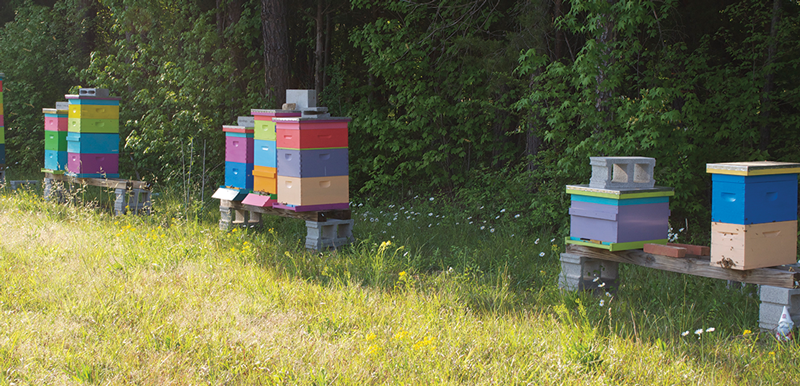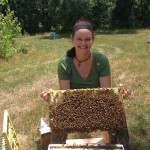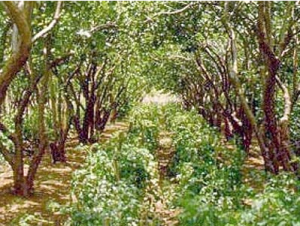By: Jessica Louque
Spring Seeds Part I – Johnny’s Selected Seeds
I’d say most of the readers for Bee Culture would consider themselves at least a hobby gardener. Bees and gardening rarely stray from each other. In this, we all share that same crossover from Winter boredom into seed catalog madness, earmarking the new varieties we want to try out and deciding whether to be “reasonable” this year or pretend to ignore the actual amount of growing capacity available. These are always some of the most colorful catalogs, displaying the rich offerings that you too can have if only you buy the seeds and take care of them. I promised myself that I wouldn’t go overboard this year like last year, and the year before, and the year before that, so I’ve only ordered a few hundred dollars’ worth of seeds so far (ha). I have favorite places to buy my seeds, based on what I want, so I’ve done a mini interview with some of them to share their offerings for their products. The first company up is Johnny’s Selected Seeds.
Johnny’s has been a staple in the garden as long as I’ve lived in my current house. They have excellent customer service, a large selection of seeds, and a fairly high germination rate. We started using them at work with our bees because they have a lot of organic heirloom varieties that we can buy in bulk without worrying what our bees might pick up from it. Last year, we bought enough pumpkin seed for 500 acres, and may have bought all of the Wee-B-Little variety available in the U.S. This year, we bought enough buckwheat for around 150 acres as our “large” purchase. They are quick to deliver and help us choose what works best in the area we need to work in, giving the positives and negatives for each variety.
The company itself has turned from a sole ownership endeavor into a 100% employee owned operation. The main office is in Winslow, Maine, with administrative offices and the call center in Fairfield, Maine, and a 40-acre research farm in Albion, Maine. The company tries out all of the varieties that are sold to the public to check for things like germination rate, disease resistance, frost resistance, drought resistance, or quality in general. Johnny’s also sells a lot of useful farm tools that are also implemented on the research farm to make sure they sell quality products. Johnny’s is also certified organic by the Maine Organic Farmers and Gardeners Association (MOFGA), and has been since 1979. All of the breeding is done the old fashioned way without genetic engineering. Even though it’s a slow process, Johnny’s has produced a lot of new varieties including my favorite ‘Bright Lights’ Swiss chard and the ‘Carmen’ sweet pepper – both of which are All-America Selectors (AAS) Winners.
Each year in the Fall, the staff at the research farm has to make the evaluations of the new varieties to see what makes the list for the next year’s catalog. One of the main goals of Johnny’s is season extension, giving them an even longer Fall for hoop houses and row covers. The result of these trials leads to some new exciting additions for 2017. I asked Johnny’s for a list of their favorite additions, and I know some of you will be ready to give these a go in your own gardens.
For the Johnny’s list, I specifically requested the staff picks for the new varieties. There are some things that are chosen just because a variety might be a little more cold tolerant, or have disease resistance, or something slightly less interesting, but the staff picks would have a little more flair or interest (in my opinion, anyway). I didn’t just want to have bee-friendly flowers, or just honey bee-pollinated crops. I think they did a nice job giving me a little bit of everything. After all, a well-rounded gardener has a whole lot of everything. Here’s the list of Johnny’s favorite upcoming selections:
Baron is a highly-adaptable, large-fruited Ancho, or Poblano, pepper. It has proven to produce better than other Anchos under challenging conditions. The fruits are very large (average size is 5” X 3”) and are typically two-lobed which makes them easy to stuff and cook in their signature dish, chile rellenos.
*Just in case you’re interested, here’s a little nudge towards trying out Baron peppers*
Chile Rellenos Recipe
- 6 fresh Ancho peppers
- 1 (8 ounce) package queso asadero (white Mexican cheese), cut into 3/4-inch thick strips
- 2 eggs, separated
- 1 teaspoon baking powder
- 3/4 cup all-purpose flour
- Preheat the oven’s broiler and set the oven rack at about six inches from the heat source. Line a baking sheet with aluminum foil. Place peppers onto the prepared baking sheet, and cook under the preheated broiler until the skin of the peppers has blackened and blistered, about 10 minutes. Turn the peppers often to blacken all sides. Place the blackened peppers into a bowl, and tightly seal with plastic wrap. Allow the peppers to steam as they cool, about 15 minutes.
Rinse cooled peppers under cold water to peel off the skins, and cut a slit along the long side of each pepper to remove the seeds and core. Rinse the peppers inside and out, and pat dry with paper towels. Stuff the peppers with strips of the cheese.
Whisk the egg yolks in a bowl with the baking powder. In a second metal bowl, beat the egg whites with an electric mixer until the whites form stiff peaks. Gently fold the beaten egg whites into the yolk mixture. Place flour into a shallow bowl.
Heat the vegetable shortening in a skillet over medium heat. Roll each stuffed pepper in flour, tap off excess flour, and dip the peppers into the egg mixture to coat both sides. Gently lay the coated peppers into the hot shortening. Fry peppers until lightly golden brown and the cheese has melted, about five minutes per side.
Blaze is a uniform, colorful, and high yielding pumpkin. Flashy fruits are yellow with orange stripes with an interesting and very uniform flattened shape. Sturdy short vine plants have excellent powdery mildew resistance and yield very well (approximately 10-12 fruits per plant). This is an excellent addition for any ornamental grower.
Blush is a long-day onion with brownish pink skins and light purple rings. It is easy to grow with vigorous foliage and produces mostly jumbo-sized, blocky-globe bulbs. Thick skins suggest excellent storage potential. Adaptation: 38-55° latitude.
This beautiful pink tomato boasts late blight resistance and a rich and tangy flavor. A compact indeterminate habit yields globe-shaped fruits that average 10-12 oz. Damsel is specifically adapted to organic growing systems. Bred for the field, but has performed well in hoophouse trials. Organic seed.
Johnny’s first organic hybrid cantaloupe. For best flavor, we recommend harvesting these conveniently sized, heavily netted fruits at forced slip or cut from the vines when the skin is mostly yellow but still has a 30-40% green hue. Bred and trialed specifically for organic cropping systems.
This open pollinated arugula is similar to Surrey, but with a much more rounded oak leaf. Esmee has an excellent flavor and impressive 3-D texture to add heft to salad mixes.
Flaminio is a higher-yielding Costata squash type. Medium to dark green with flecking; ridges are a lighter green. Plants have full bush habit, but are more manageable with moderate spines and less sprawling. Flaminio out-yielded the OP strain and other hybrid Costata types in our trials. Large, attractive male and female blossoms are ideal for edible flowers. Fruits are best when picked at 6-8” length.
The best container variety. Bright-purple flowers add beauty to this compact, edible ornamental. This true mini is well-suited for balconies, patios, and gardens. Spineless fruits for pain-free harvest.
This lovely zinnia has a Sophisticated color combination. Mostly double and semi-double 2-3 1/2” blooms with a small percentage of singles. Excellent performance and stunning color in our trials.
I fully plan to invest in the zinnias, eggplant, cantaloupe, and let’s be honest here – I’ll probably buy them all. If you give any or all of these a try, please let me know how they do in your garden and maybe I’ll be able to do a follow-up after the growing season. If you happen to be in the area, Johnny’s does offer self-guided tours from July through September, Monday through Friday, from 9:00 AM to 4:00 PM. They will give you a tour packet to augment your trip, but if you have enough people, a guided tour for a group can be arranged by calling Customer Service at 207-861-3900. This is one of my favorite seed companies, so I hope you can find some great options for your 2017 growing season online at http://JohnnySeeds.com or by requesting one of their very pretty catalogs.



















